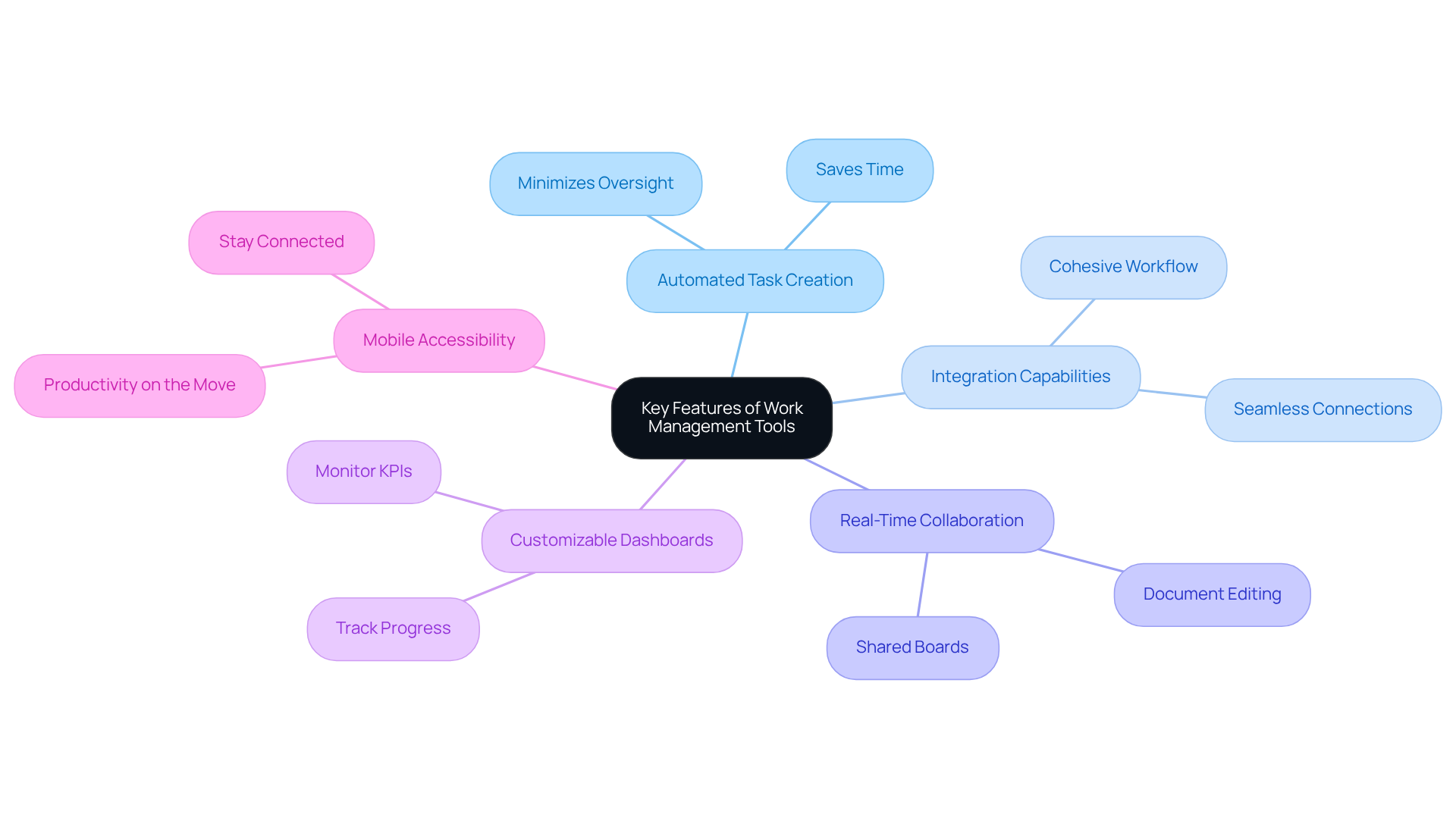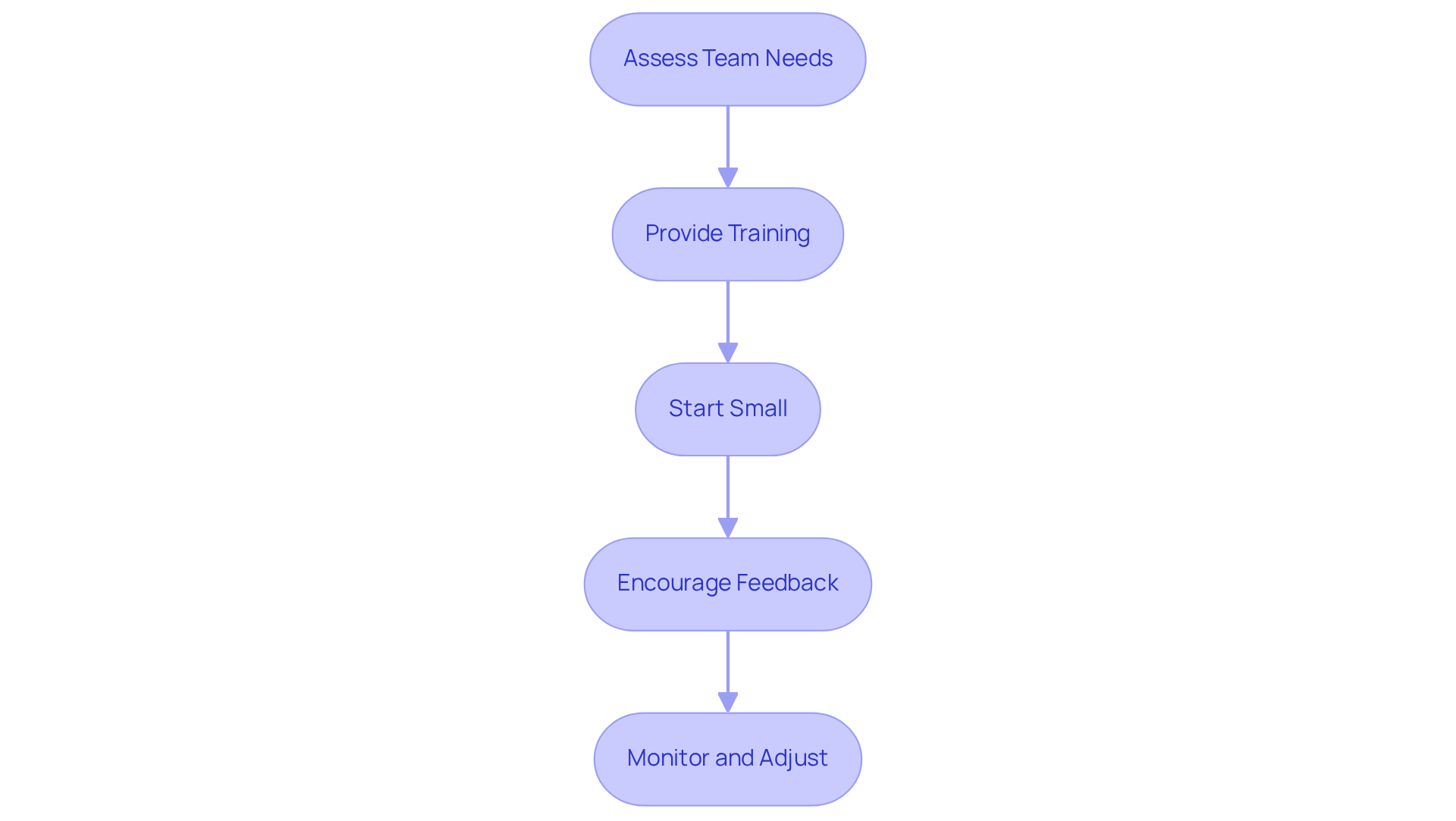Overview
The three essential work management tools for startup success—automated task creation, integration capabilities, and real-time collaboration features—are crucial for any founder. These tools not only streamline processes and enhance team communication; they also adapt to the evolving needs of startups. This adaptability ultimately fosters productivity and accountability within teams, making them indispensable in today’s fast-paced environment. Are you ready to leverage these tools to elevate your startup's performance?
Introduction
In an era where startups must navigate rapid changes and fierce competition, the right tools can be the difference between success and stagnation. Work management tools emerge as vital assets, streamlining communication and enhancing productivity. This empowers teams to focus on innovation rather than administrative tasks.
However, with a myriad of options available, how can startups discern the most effective features and best practices for successful integration? Exploring these essential elements can empower new ventures to harness the full potential of work management tools, ultimately driving their success forward.
Understand the Importance of Work Management Tools in Startups
In the dynamic landscape of new ventures, where adaptability and effectiveness are paramount, work management tools emerge as essential resources. They facilitate seamless communication, task monitoring, and project coordination using work management tools, empowering teams to focus on innovation rather than administrative burdens. By automating routine tasks and providing clear insights into project progress, these resources help startups maintain momentum and swiftly adapt to changing demands.
Consider a startup leveraging a tool like Casy; it can automatically convert chat conversations into actionable tasks, ensuring that vital information is never overlooked and that team members stay aligned with their objectives. This not only boosts productivity but also cultivates a culture of accountability and transparency within the team.
Are you ready to transform your startup's operations and embrace a more efficient way of working?
Identify Key Features of Effective Work Management Tools
When selecting work management tools, startups must prioritize features that enhance collaboration and streamline processes. What key features should be at the forefront of your decision-making? Consider the following:
- Automated Task Creation: Tools that automatically generate tasks from conversations or emails not only save valuable time but also minimize the risk of oversight.
- Integration Capabilities: It's crucial that efficient resources seamlessly connect with existing platforms like Slack, Google Drive, and CRM systems, creating a cohesive workflow.
- Real-Time Collaboration: Features that allow team members to collaborate in real-time—such as shared boards and document editing—are vital for maintaining momentum.
- Customizable Dashboards: Startups benefit from resources that offer customizable dashboards to track progress and key performance indicators (KPIs) relevant to their specific objectives.
- Mobile Accessibility: Given the fast-paced nature of new businesses, mobile-compatible resources ensure that team members can stay connected and productive while on the move.
By focusing on these essential characteristics, new ventures can select work management tools that not only meet their current needs but also evolve alongside their growth.

Implement Best Practices for Integrating Work Management Tools
Incorporating work management tools into a startup's current workflows requires meticulous planning and execution. To ensure a successful integration, consider the following best practices:
- Assess Team Needs: Prior to implementation, conduct a thorough assessment of your team's specific needs and workflows. This crucial step will help identify which features are most relevant and necessary.
- Provide Training: Offer comprehensive training sessions for team members to familiarize them with the new resource. This can include hands-on workshops, tutorials, and ongoing support to address any questions that may arise.
- Start Small: Initiate a pilot program involving a small group or project. This approach allows for the assessment of the system's effectiveness and the collection of feedback before a full-scale rollout.
- Encourage Feedback: Establish avenues for team members to share their thoughts on the system's functionality and usability. This valuable input can guide necessary adjustments and improvements.
- Monitor and Adjust: Following implementation, continuously observe the impact on productivity and workflows. Be prepared to make adjustments based on team feedback and evolving needs.
By adhering to these best practices, startups can ensure that their integration of work management tools is both smooth and effective, ultimately leading to enhanced productivity and collaboration.

Conclusion
In the fast-paced world of startups, the implementation of effective work management tools is not just beneficial; it is essential for success. These tools play a vital role in enhancing productivity, fostering collaboration, and enabling teams to concentrate on their core mission of innovation. By automating routine tasks and ensuring clear communication, startups can navigate the complexities of growth while maintaining agility and responsiveness.
The importance of selecting work management tools that offer key features cannot be overstated. Look for:
- Automated task creation
- Integration capabilities
- Real-time collaboration
- Customizable dashboards
- Mobile accessibility
These features streamline processes and adapt to the evolving needs of a growing business. However, integrating these tools must be approached strategically. This involves a careful assessment of team needs, comprehensive training, and ongoing feedback to ensure maximum effectiveness.
Ultimately, embracing the right work management tools can significantly impact a startup's trajectory. By prioritizing these resources and implementing best practices for their integration, startups can enhance their operational efficiency and foster a culture of accountability. As the landscape of entrepreneurship continues to evolve, investing in effective work management solutions is not just a choice; it is a crucial step toward achieving long-term success and sustainability.
Frequently Asked Questions
Why are work management tools important for startups?
Work management tools are essential for startups as they facilitate seamless communication, task monitoring, and project coordination, allowing teams to focus on innovation rather than administrative tasks.
How do work management tools help improve productivity in startups?
By automating routine tasks and providing clear insights into project progress, work management tools help startups maintain momentum and adapt quickly to changing demands, ultimately boosting productivity.
Can you provide an example of a work management tool and its benefits?
An example is Casy, which automatically converts chat conversations into actionable tasks. This ensures vital information is not overlooked and helps team members stay aligned with their objectives, fostering accountability and transparency.
What cultural benefits do work management tools bring to a startup?
Work management tools cultivate a culture of accountability and transparency within the team, as they help track progress and responsibilities effectively.
How can startups transform their operations using work management tools?
Startups can embrace a more efficient way of working by implementing work management tools that streamline processes, enhance communication, and improve task management.




